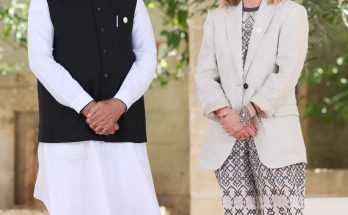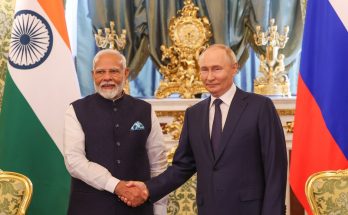By Pankaj Saran
Russia’s controversial war on Ukraine compelled India to engage in a delicate diplomatic tightrope, balancing its ties with Moscow and the West. Going forward, despite international pressure, Russia will continue to remain an indispensable partner of India, which will expect Moscow to be sensitive to protect its security interests vis-à-vis China and Pakistan, says Pankaj Saran.
The launch of Russia’s “Special Military Operations” against Ukraine on February 24, 2022 has been disruptive for India-Russia relations, as it has been for Russia’s relations with the rest of the world.

In the immediate days after the Russian attack in Ukraine, India’s primary challenge was to navigate its diplomatic response, balancing the principles of international law, the values which India stands for, and its national interest. There was outrage in the US, Europe and other Western allies over Moscow’s actions. The matter was taken to the United Nations, including to the Security Council. World reactions were divided with large swathes of Asia, Africa, Central Asia, West Asia and Latin America preferring to maintain silence, or choosing to lie low.
Balancing Act
As it turned out, the Indian response was noteworthy for its caution, deliberately avoiding direct criticism or condemnation of Moscow. India’s voting in the United Nations was marked by repeated abstentions in the initial weeks, at the Security Council, the General Assembly and, in organs such as the Human Rights Council. India’s position was outlined in the Parliament by External Affairs Minister Dr S. Jaishankar on April 6, 2022.
A key focus of government policy soon after the outbreak of hostilities was to evacuate more than 22,000 students stranded in Ukraine, and to provide humanitarian aid to some of Ukraine’s neighbours. This entailed active diplomatic engagement with all sides, and was a most successful exercise. After handling the urgent matter of welfare of its students, India was forced to deal with other collateral damages of the conflict – fuel, fertilizer and food. India had to deal with extreme volatility of energy prices, with the price of oil swinging from USD 90 to USD 110 per barrel, the uncertainty of secondary sanctions, and Western pressure on our decision to import small quantities of oil from Russia at discounted prices.
India held its position by arguing that these were commercial, and not political, decisions meant to protect the Indian economy form runaway inflation, and ensure energy security for its people. The same considerations were relevant in the case of fertiliser imports from Russia, which India has been relying on to supplement its own production, and support its critical agriculture sector, as well as the import of certain food items such as pulses and vegetable oil. Similarly, India’s imports of oil seeds and certain agricultural products from Ukraine were also disrupted.
In short, India faced significant supply chain disruptions in highly price -sensitive commodities, which added to domestic inflationary pressures. For India, these negative headwinds were most untimely, because the country’s goal was to quickly emerge from the impact of the pandemic. The conflict served neither any strategic nor commercial interest for India, except for a brief opportunity to fill the global supply gap of wheat, which was also short lived. The other, but equally transient, benefit was the availability of cheaper Russian oil.
Long-term Challenges
There is longer-term challenge that India faces and will address, in the same way that it has managed several other external shocks in the past. The first is the impact of the secondary sanctions on Russia, imposed by the US and EU, on India. There is no doubt that the government will be studying the legal implications of these sanctions closely. It has the experience of the Iran and Myanmar sanctions to go by, and there is greater expertise available in the country on this issue. Those who have imposed the sanctions themselves are forthright in stating that the objective of the sanctions is political. Thus, the weaponisation of international finance, trade and investment is the new geopolitical reality.
The second impact of the conflict is on India’s relationship with the West. These have been adversely affected because of a mismatch of strategic perceptions and expectations on either side. There is no question that India and the West are united in their commitment to democratic values and the internationally recognised principles of sovereignty of nations and territorial integrity, and non-interference in the internal affairs of each other. It is also a fact that India feels the conflict between Russia and Ukraine could have been avoided through genuine good faith efforts. This means not giving up the path of diplomacy and negotiations to resolve issues, and taking into account the legitimate security interests of all sides.
India has consistently called for dialogue and peaceful settlement of differences between all sides. India’s long-standing relations with Russia are no secret to anyone. Facts would show that some European leaders in the past have maintained more frequent contacts with the Russian leadership than the Indian leadership. Similarly, the level of economic integration, or even the intensity of people-to-people exchanges between Europe and Russia is far greater than it is between India and Russia.
India does not see Russia as a threat to its security. On the other hand, India is faced with an expansionist and aggressive China on its land border. The rise of China is the present and future challenge that needs to be focused upon by the most powerful military alliance in the world. The NATO Summit in Spain in June 2022 did, to some extent, acknowledge the China threat, but this remains work in progress.
Following the Ukraine war, India has taken several steps to explain its position to the West, and also continue on the path of consolidation of our relations with the US and Europe. These include the institutionalisation of the Quad at the level of the leaders, intensification of exchanges with Europe, especially with Central and East European countries, and strengthening of the strategic partnerships with Australia and Japan. It is clear that India has major stakes in a close partnership with the US to achieve our strategic, defence, economic and technological goals in the coming years. That India was represented by its president, Draupadi Murmu, at the funeral of Queen Elizabeth II in London, shows the value that India attaches to its links with the Anglo-Saxon world, and the values it shares as a fellow liberal democracy.
The Road Ahead
The third impact of the conflict is on the India-Russia relationship itself. From a security perspective, India’s priority will be to ensure the integrity and soundness of its Russian-origin military hardware and ongoing defence projects. But this is also the time to look at the opportunities such as increasing the level of joint Indo-Russian military production in India as part of the “Make in India” programme. We should come up with new ideas for boosting trade and economic relations, connectivity and cooperation in the fields of energy, raw materials, agriculture and labour mobility with Russia. In the long term, Russia will remain a valuable source of energy and raw materials necessary for India’s growth.
The Russian Far East itself is twice the size of India. Russia’s coastline accounts for more than 50 per cent of the Arctic Ocean coastline. Prime Minister Narendra Modi’s participation as chief guest in the Eastern Economic Forum in 2019 in Vladivostok opened a new dimension to our relations with Russia. This outreach is supplemented by specific proposals made by the Prime Minister in his recent virtual address to the Eastern Economic Forum on September 7, 2022.
Samarkand Meeting

If India has to safeguard and advance its global strategic interests, it has to pursue an active foreign, military, economic and strategic policy in both the Eurasian and maritime theatres. This is the call of geography.
Within the Eurasian landmass, Russia is an indispensable partner for India. This is the reason why India has become more engaged with the Shanghai Cooperation Organisation since 2016. Prime Minister Modi’s visit to Samarkand in September 2022 for the SCO Summit and his bilateral meeting with President Vladimir Putin is a reflection of this strategy.
Next year, India will itself host the SCO Summit as the chair of the organisation. PM Modi conveyed to President Putin that India-Russia relations are of long standing and both countries have helped each other in times of need. India is likely to continue with this policy, and will expect that Russia, in turn, will remain sensitive to India’s concerns, and protect its security interests vis-à-vis China and Pakistan.
(Pankaj Saran served as Deputy National Security Adviser of India and India’s Ambassador to Russia. He
was the Joint Secretary in the Prime Minister’s Office, New Delhi from 2007 to 2012. Saran was the Indian High Commissioner to Bangladesh in 2015 when the historic India-Bangladesh Land Boundary Agreement was ratified by the Parliament of India. He has served at Indian missions in Moscow, Washington, D.C., Cairo and Dhaka.)
(This article has been published in the latest edition of India and The World magazine. To subscribe to magazine, write to: indiawritesgroup@gmail.com
Russia-Ukraine War-Pankaj Saran (1)Author Profile
- India Writes Network (www.indiawrites.org) is an emerging think tank and a media-publishing company focused on international affairs & the India Story. Centre for Global India Insights is the research arm of India Writes Network. To subscribe to India and the World, write to editor@indiawrites.org. A venture of TGII Media Private Limited, a leading media, publishing and consultancy company, IWN has carved a niche for balanced and exhaustive reporting and analysis of international affairs. Eminent personalities, politicians, diplomats, authors, strategy gurus and news-makers have contributed to India Writes Network, as also “India and the World,” a magazine focused on global affairs.
Latest entries
 In ConversationJuly 26, 2024India-Italy defence collaboration can extend to third countries: Anil Wadhwa
In ConversationJuly 26, 2024India-Italy defence collaboration can extend to third countries: Anil Wadhwa In ConversationJuly 23, 2024Italy views India as a key partner in Indo-Pacific: Vani Rao
In ConversationJuly 23, 2024Italy views India as a key partner in Indo-Pacific: Vani Rao DiplomacyJune 29, 2024First BRICS unveils a roadmap for boosting tourism among emerging economies
DiplomacyJune 29, 2024First BRICS unveils a roadmap for boosting tourism among emerging economies India and the WorldJune 11, 2024On Day 1, Jaishankar focuses on resolving standoff with China
India and the WorldJune 11, 2024On Day 1, Jaishankar focuses on resolving standoff with China







